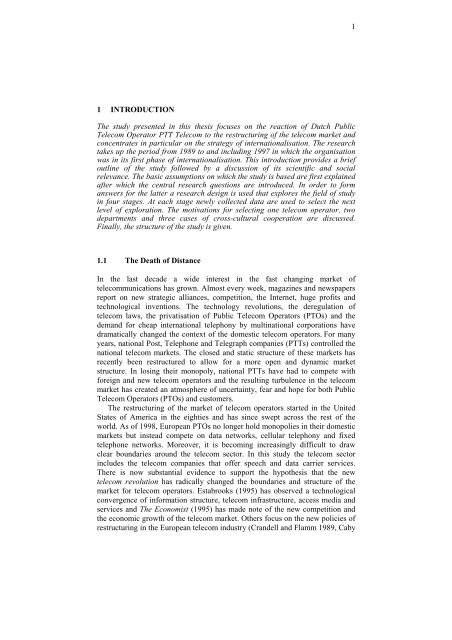The Internationalisation of PTT Telecom: A Cultural Perspective - Free
The Internationalisation of PTT Telecom: A Cultural Perspective - Free
The Internationalisation of PTT Telecom: A Cultural Perspective - Free
- No tags were found...
Create successful ePaper yourself
Turn your PDF publications into a flip-book with our unique Google optimized e-Paper software.
11 INTRODUCTION<strong>The</strong> study presented in this thesis focuses on the reaction <strong>of</strong> Dutch Public<strong>Telecom</strong> Operator <strong>PTT</strong> <strong>Telecom</strong> to the restructuring <strong>of</strong> the telecom market andconcentrates in particular on the strategy <strong>of</strong> internationalisation. <strong>The</strong> researchtakes up the period from 1989 to and including 1997 in which the organisationwas in its first phase <strong>of</strong> internationalisation. This introduction provides a briefoutline <strong>of</strong> the study followed by a discussion <strong>of</strong> its scientific and socialrelevance. <strong>The</strong> basic assumptions on which the study is based are first explainedafter which the central research questions are introduced. In order to formanswers for the latter a research design is used that explores the field <strong>of</strong> studyin four stages. At each stage newly collected data are used to select the nextlevel <strong>of</strong> exploration. <strong>The</strong> motivations for selecting one telecom operator, twodepartments and three cases <strong>of</strong> cross-cultural cooperation are discussed.Finally, the structure <strong>of</strong> the study is given.1.1 <strong>The</strong> Death <strong>of</strong> DistanceIn the last decade a wide interest in the fast changing market <strong>of</strong>telecommunications has grown. Almost every week, magazines and newspapersreport on new strategic alliances, competition, the Internet, huge pr<strong>of</strong>its andtechnological inventions. <strong>The</strong> technology revolutions, the deregulation <strong>of</strong>telecom laws, the privatisation <strong>of</strong> Public <strong>Telecom</strong> Operators (PTOs) and thedemand for cheap international telephony by multinational corporations havedramatically changed the context <strong>of</strong> the domestic telecom operators. For manyyears, national Post, Telephone and Telegraph companies (<strong>PTT</strong>s) controlled thenational telecom markets. <strong>The</strong> closed and static structure <strong>of</strong> these markets hasrecently been restructured to allow for a more open and dynamic marketstructure. In losing their monopoly, national <strong>PTT</strong>s have had to compete withforeign and new telecom operators and the resulting turbulence in the telecommarket has created an atmosphere <strong>of</strong> uncertainty, fear and hope for both Public<strong>Telecom</strong> Operators (PTOs) and customers.<strong>The</strong> restructuring <strong>of</strong> the market <strong>of</strong> telecom operators started in the UnitedStates <strong>of</strong> America in the eighties and has since swept across the rest <strong>of</strong> theworld. As <strong>of</strong> 1998, European PTOs no longer hold monopolies in their domesticmarkets but instead compete on data networks, cellular telephony and fixedtelephone networks. Moreover, it is becoming increasingly difficult to drawclear boundaries around the telecom sector. In this study the telecom sectorincludes the telecom companies that <strong>of</strong>fer speech and data carrier services.<strong>The</strong>re is now substantial evidence to support the hypothesis that the newtelecom revolution has radically changed the boundaries and structure <strong>of</strong> themarket for telecom operators. Estabrooks (1995) has observed a technologicalconvergence <strong>of</strong> information structure, telecom infrastructure, access media andservices and <strong>The</strong> Economist (1995) has made note <strong>of</strong> the new competition andthe economic growth <strong>of</strong> the telecom market. Others focus on the new policies <strong>of</strong>restructuring in the European telecom industry (Crandell and Flamm 1989, Caby




